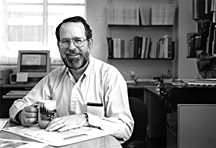Frank DiSalvo named director of Cornell Center for Materials Research, NSF-supported national center
By David Brand

Francis (Frank) DiSalvo has been named director of the Cornell Center for Materials Research (CCMR), one of 29 such national centers supported by the National Science Foundation (NSF). DiSalvo has agreed to serve for five years.
DiSalvo, the John A. Newman Professor of Physical Sciences at Cornell since 1996, succeeds Neil Ashcroft, the Horace White Professor of Physics, who has held the post for the past three years. Ashcroft, who is returning to research and teaching, says of DiSalvo: "He is a very distinguished physical chemist with broad and far-sighted interests in materials research and with a strong background in industry."
The CCMR is an interdisciplinary research center funded by the NSF's Materials Research Science and Engineering Centers Program. The center reports directly to the office of the Cornell vice provost for research, and its membership spans the College of Arts and Sciences and the College of Engineering.
"We can foresee several developments in the years ahead for CCMR," says DiSalvo. "First, we want to expand our support base. We hope that CCMR will become an umbrella organization for different collaborative materials research programs. Presently our major sources of support are the NSF and the university." But, he says, the NSF is limited in the support it can provide for all of CCMR's interdisciplinary research or new research that is envisioned for the near future. "Second, we are expanding our very successful educational outreach program and initiating a much expanded industrial outreach program with the help of generous state support. Third, we continue to aim to be the best nationally and internationally at what we do: materials research," DiSalvo says. DiSalvo received his B.S. in physics from the Massachusetts Institute of Technology in 1966 and his Ph.D. in applied physics from Stanford University in 1971, following which he joined the research staff at AT&T Bell Laboratories (now Lucent Technologies), where he later headed several research departments. In 1986 he moved to Cornell's chemistry department (now the Department of Chemistry and Chemical Biology), teaching freshman chemistry for engineers, a course in scientific literacy for non-scientists, senior-level inorganic chemistry, and a graduate course in solid state chemistry. He is currently teaching a junior-level laboratory course in instrumental analysis.
In 1991 DiSalvo was awarded the American Physical Society International Prize for New Materials and was elected to the National Academy of Sciences. He is a fellow of the American Academy of Arts and Sciences. He has published more than 300 scientific articles and holds eight patents.
The main goal of the new director's research has been the discovery and understanding of new chemical and physical phenomena in solids. Particular research emphasis is on the synthesis of novel compounds and the subsequent characterization of their structural, thermal, electrical, and magnetic properties. Compound types extensively examined include chalcogenides, oxides and more recently nitrides, structurally low-dimensional phases, metal cluster phases and intermetallic compounds. Phenomena of interest have included thermoelectric cooling, intercalation reactions, reversible reactions for battery cathodes, structural phase transitions, magnetic properties of crystalline and amorphous materials, charge density waves and superconductivity.
Recently the NSF renewed the CCMR's funding, awarding the center $19.9 million over five years to support the work of five interdisciplinary research groups, four seed projects, seven major shared experimental facilities and three outreach programs in the center. At the same time, the office of New York Gov. George Pataki announced state matching funds for the CCMR, tied to the NSF grant, of $400,000 a year over five years to support a new industrial outreach program for small businesses.
Cornell Center for Materials Research: http://www.CCMR.cornell.edu/.
Media Contact
Get Cornell news delivered right to your inbox.
Subscribe